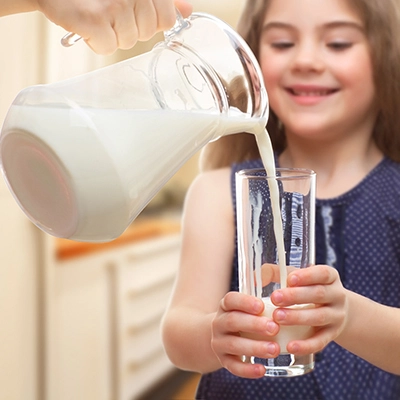Why Is Milk Part of School Meals?
Dairy milk is an integral part of the federal school meals program due to its unique nutritional package. One glass of milk delivers 13 essential nutrients that fuel children’s growth, development and learning, making it an important component of their overall diet.
School Milk Helps Children Meet Nutritional Needs
According to U.S. Department of Agriculture (USDA) data, school meals are the richest source of dairy in children’s diets. A 2017 study showed 77% of daily milk consumption and 70% of total dairy consumption for low-income children aged 5-18 came from the national school meals programs, underscoring the importance of school meals and milk’s role in helping children meet their nutritional needs for growth and development. Because most children and adolescents don’t meet daily dairy recommendations, school meals can help close the gap and bring students closer to nutrient recommendations for calcium, vitamin D, potassium and other nutrients provided by milk.
Chocolate and Flavored Milk in Schools
The USDA allows low-fat (1%) and fat-free (skim) chocolate and other flavored milks in schools and states “flavored milk has received high palatability ratings from children and has been shown to encourage milk consumption among school-aged children. Studies indicate that children drink more flavored milk than unflavored milk, and that flavored milk served in the school meal programs is wasted less than unflavored milk.” Furthermore, studies show that consumption of flavored milk is associated with better overall diet quality without any adverse impact on weight.
School Meal Milk Standards
The school milk standards require that:
- All milk must be fat-free or low-fat.
- Milk may be unflavored or flavored.
- A variety of milk (two options) must be offered.
- Unflavored milk must be offered at each meal service.
- Low-fat or fat-free lactose-free and reduced-lactose milk may be offered.
When deciding the two varieties of milk to offer, a school can consider the fat level or flavor. For example, a school can offer low-fat unflavored and low-fat flavored milk to meet the variety requirement. By broadening milk choices in schools, students have more options that encourage milk consumption and increase the chance they will meet their recommended daily servings.
If you have questions about school milk in your area, please reach out to your local dairy council.















